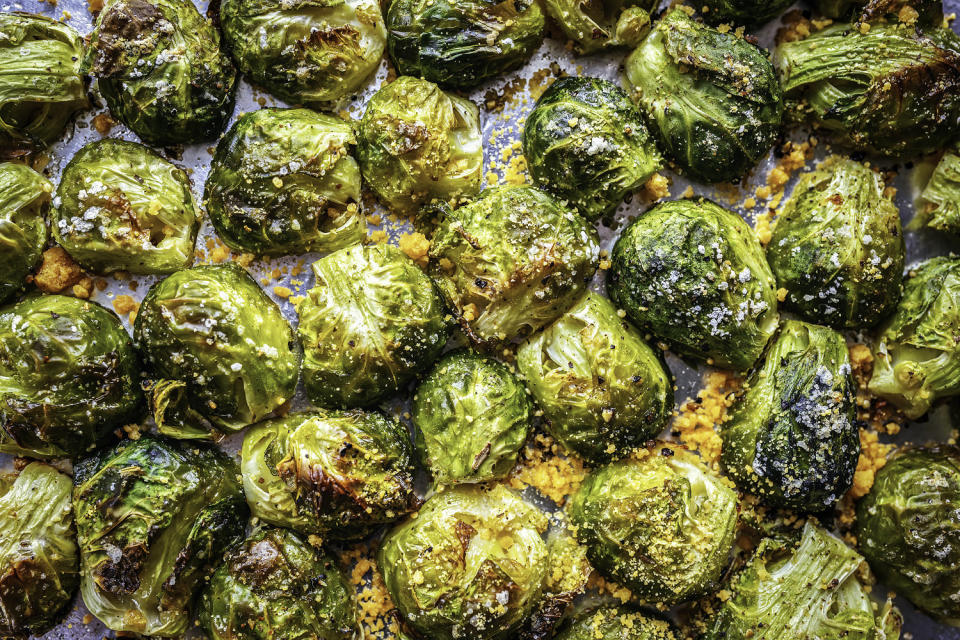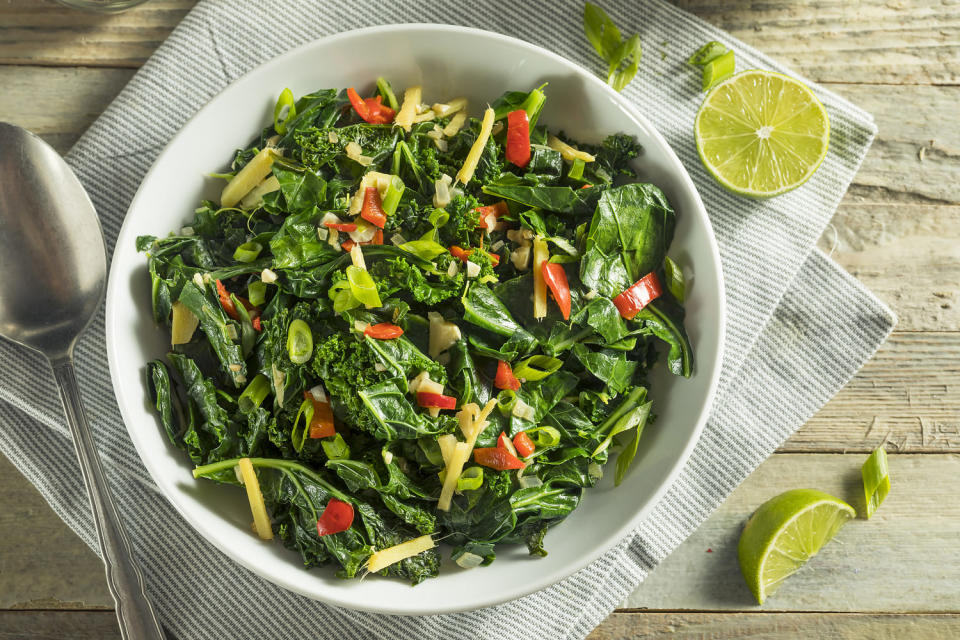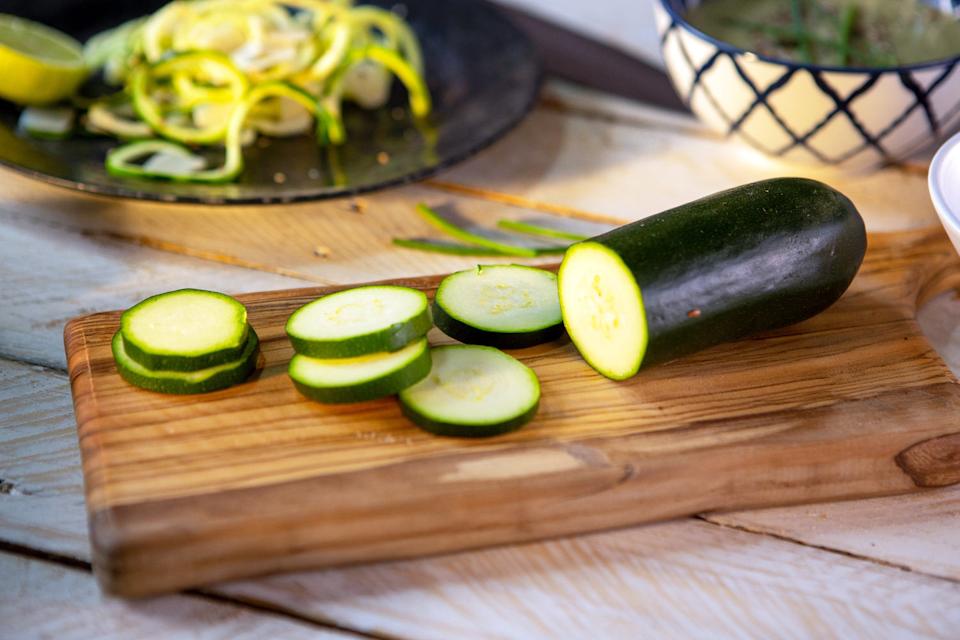A healthy diet includes quality carbohydrates like whole grains, legumes, lentils and vegetables. But it’s not a bad idea to limit carbs that are from refined grains and sugars if you want to go low-carb or keto.
Lower-carbohydrate lifestyles can help to improve chronic conditions like Type 2 diabetes, aid in weight loss and weight maintenance, and may even help to increase metabolism.
Ideally, low-carb diets should contribute to people eating more vegetables, since veggies not only provide vitamins and minerals, but can replace the fiber from foods that are often cut back during a low-carb diet, such as grains and beans.
If you’re on a ketogenic diet, aim to get at least five servings of differently-colored veggies each day, which will help you get enough fiber and nutrients.
Here are 20 low-carb vegetables to try. (Note: The total carbs for a serving of each vegetable is the net carbs, which is total carbs minus fiber).
Arugula (0.41 carbs per cup)
A leafy green with a peppery flavor, arugula is high in plant-based nitrates, which can improve blood pressure and heart health, studies show. Try grilled wild salmon with arugula greens tossed in extra virgin olive oil and fresh lemon juice.
Radishes (1 carb per half-cup)
A 2023 study found that vegetables like radishes, which are high in anthocyanins (pigments found in red, blue and purple plants), may help reduce inflammation and improve gut health. Chop or julienne radishes and add to a slaw mix or salad.
Celery (0.2 carbs per small stalk)
With its anti-inflammatory properties, celery has many benefits, from reducing lipids and blood pressure to helping maintain a healthy weight. The stalk can be chopped and used in soups and salads, or as a dipper for nut butter. And celery leaves may benefit liver and cardiovascular health, studies have found.
Eggplant (2.36 carbs per cup)
Eggplant may actually reduce psychological stress, according to a 2019 randomized controlled trial. This vegetable is rich in choline esters, which also benefit blood pressure, and since it is high in fiber, eggplant is easier to digest. Try eggplant as a savory side by turning it into a nutrient-packed baba ganoush.
Asparagus (2.4 carbs per cup)
Asparagus is an antioxidant-rich vegetable, and just one cup of asparagus provides potassium, calcium and folate. It’s an excellent side to main dishes, but you may have noticed that when you eat it, it causes your urine to smell. This is due to the presence of aspargusic acid, which the body breaks down into sulfur-containing compounds.
Fennel (3.65 carbs per cup)
The fennel bulb is not often found in everyday recipes, but add it to your grocery list and then to salads, soups and sauces. Fennel may help menopausal symptoms, according to a 2017 randomized controlled trial that found it to help with hot flashes, vaginal dryness, anxiety and sleeplessness.
Spinach (.34 carbs per cup)
Eat more spinach to get a good dose of magnesium, a mineral that may lower the risk of dementia, according to a 2023 study. Researchers found that healthy people consuming at least 550 milligrams of magnesium daily (considered a higher intake) could have a reduced risk of neurodegenerative disease later in life. Add spinach to smoothies, scrambled eggs, sauces and of course, salads.
Cauliflower (3.27 carbs per cup)
Cauliflower has made quite a splash in recent years as cauliflower rice or pizza crust. Cruciferous vegetables like cauliflower can reduce the severity of nonalcoholic fatty liver disease, a leading cause of liver cancer, according to a study published in the journal “Hepatology.”
Kohlrabi (3.5g net carbs per cup)
Kohlrabi is colorful, versatile in recipes, fiber-rich, and nutrient-dense. It is also a vegetable you may need to utilize more in your dietary pattern. Kohlrabi is a member of the brassica family (along with cabbage, kale and broccoli) and has similar benefits to other cruciferous vegetables, like prevention against certain cancers, better gut health, and improved blood vessel function. You can use the greens of Kohlrabi in salads, and the bulb makes for an excellent dipper for hummus — just peel and slice!

Brussel Sprouts (4.54 carbs per cup)
Brussels sprouts have become a superstar in the cruciferous vegetables world, finding their way onto restaurant menus and family tables. They are great roasted, sautéed or shaved onto a protein bowl. They also have impressive health benefits, playing a role in improving blood vessel health, preventing certain cancers and promoting gut health.
Tomatoes (4.84 carbs per cup)
Though technically a fruit, tomatoes are often used in meals and snacks as a vegetable would be. The easiest way to consume tomatoes is through tomato sauce. Tomato sauce and tomato paste are abundant in a carotenoid called lycopene, which has been shown in multiple studies to play a role in the prevention of cancer and cardiovascular disease. Add tomato sauce to zucchini spirals and chicken meatballs for a low-carb version of the Italian favorite.

Collard greens (2.02 carbs per cup)
Collard greens boast one of the highest sources of plant-based calcium. In fact, one serving provides over 20% of your daily needs for the mineral. That makes this plant a must for anyone interested in maintaining good bone health. Collard greens are the perfect keto-friendly lettuce wrap for chicken or steak tacos.
Broccoli rabe (0.06 carbs per cup)
Broccoli rabe is a mix between traditional broccoli stalks paired with leafy greens — the best of both worlds! The combination also makes it a great way to get more folate; a B vitamin that many individuals don’t get enough of. Folate has been found to help reduce the risk of certain cancers and reduce the risk for neural tube defects in infants. Sauté broccoli rabe with garlic and mix with chicken sausage for a delicious and filling meal.
Shallots (1.4g net carbs per 1 tablespoon)
If you love utilizing onions and garlic to flavor your meals and snacks, then shallots may offer the best of both worlds. Shallots are part of the same family as onions and garlic — the allium family. Allium-rich foods release a chemical called allicin when crushed or chopped. This chemical has also been associated with the prevention and management of type 2 diabetes, cardiovascular disease, and prevention of certain cancers.
Kale (0.067 carbs per cup)
This keto-friendly cruciferous vegetable boasts several varieties and is a nutritional powerhouse. Studies show that lutein is one standout component; the powerful carotenoid may help to protect and preserve brain function and improve eye health. Make kale your go-to snack by replacing carb-heavy snacks (think: chips and pretzels) with homemade kale chips.

Spaghetti squash (7.53 carbs per cup)
No spaghetti on a low-carb plan? No problem! Spaghetti squash not only makes a great low-carb alternative to spaghetti, but this super squash may also help with overall weight loss and digestive health due to its high fiber status. To keep the carb content of your spaghetti squash even lower, choose pesto or Alfredo sauce over tomato sauce.
Portobello mushrooms (2.16 carbs per mushroom)
Want to go low carb while eating less meat? Portobello mushrooms are a perfect choice. No matter how you use fungi, studies show that the benefits to your health will be abundant. That’s because mushrooms contain large varieties of antioxidants shown to improve health markers. Stuff portobello mushrooms with cheese, herbs and keto-friendly breadcrumbs and roast in the oven for a decadent meal or snack.
Green beans (4.27 carbs per cup)
There’s nothing boring about green beans and they will be your best companion when it comes to keeping your hunger satisfied on a low-carb diet. That’s because green beans are low in calories, but high in filling fiber. Steam green beans and pair them with shaved parmesan, salt and pepper and slivered almonds.

Zucchini (2.62 carbs per cup)
Zucchini is a low-carb wonder for meals and snacks. It’s a high-water vegetable, meaning that it not only fuels your health, but keeps you hydrated as well. Try air frying zucchini sticks for a satisfying side dish or snack.
Bell peppers (4.38 carbs per cup)
Bell peppers contain one of the most important signs of high nutrient density — abundant color. Whether you use green, orange, yellow or red, these slightly sweet additions can improve your meals while supporting a healthy immune system. That’s because bell peppers are a great way to get adequate vitamin C (an immune system essential) while you limit more carb-heavy citrus fruits. Pair chopped bell peppers with mushrooms and onions and toss with scrambled eggs for a nutrient dense and protein-packed omelet.
This article was originally published on TODAY.com
Signup bonus from




